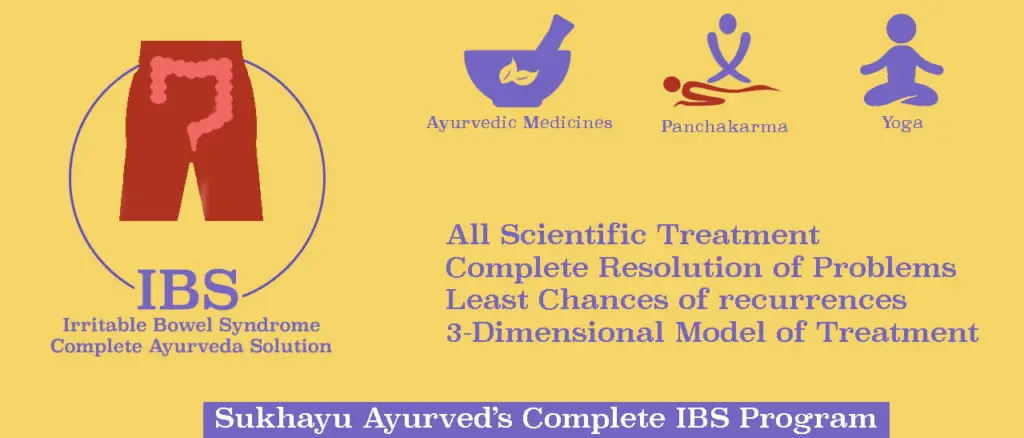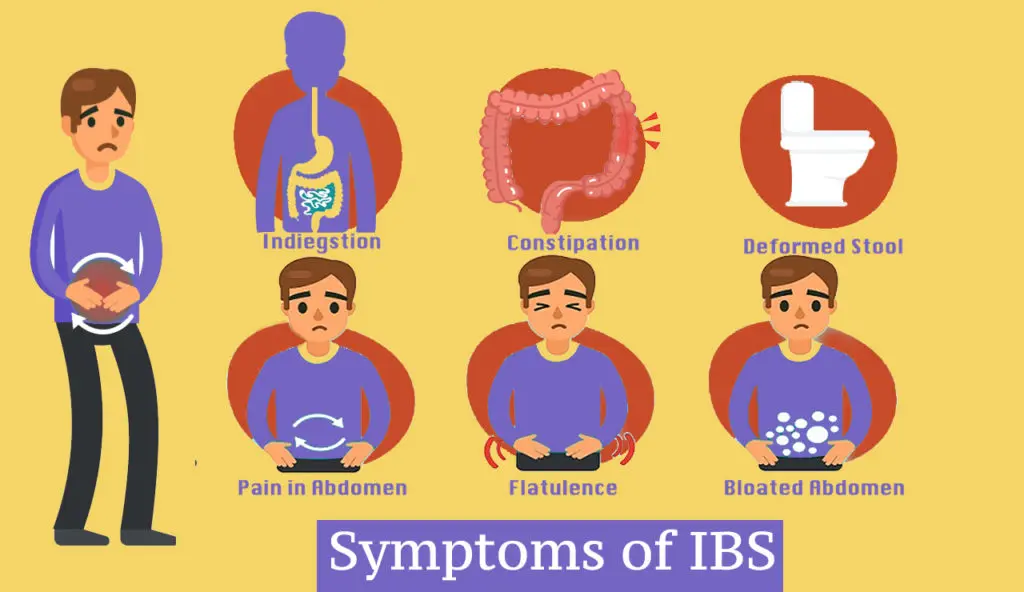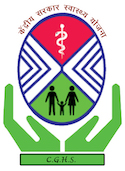Irritable bowel syndrome is a condition that affects the large intestine. It is all about irregular bowel function in nutshell. It involves recurrent diarrhea or constipation and abdominal pain. IBS is often associated with depression, anxiety, stress, and previous intestinal infection. It is a chronic disorder that needs long-term management. This condition remains incurable most of the time. Ayurveda treatment for IBS comes from Sukhayu Ayurved under Vaidya Pardeep Sharma a qualified ayurvedic practitioner who can help you to lead a normal life.

Facts on Irritable Bowel Syndrome
- Irritable bowel syndrome or IBS is a very widespread disorder. It affects about 15-22% of the population worldwide.
- IBS is a separate condition from inflammatory bowel disease and is not related to other bowel conditions.
- It is also known as irritable colon, spastic colon, spastic colitis, and mucous colitis.
- Ayurveda uses the word- Grahani for this condition.
- Vataja Grahani is the subtype of Grahani, which is closer to IBS.
- The IBS Symptoms last at least three months and at least three days per month
- IBS affects females more in comparison to males.
- Some patients with IBS have minor IBS symptoms. In others, the somatic and psychological symptoms are so significant that they disturb their daily activities.
- In rare cases, inflammatory bowel syndrome leads to intestinal damage.
- IBS does not increase the risk of gastrointestinal cancer.
- Most of the people suffering from IBS are under the age of 50. However, it may also happen in older adults.
- Symptoms of irritable bowel syndrome IBS are unpredictable. The IBS symptoms are even sometimes contradictory.
- Due to the varied possible causes, it is difficult to prevent IBS.
Symptoms of Irritable Bowel Syndrome
Because IBS is a condition related to the intestines, therefore most of the symptoms of this disease are related to the digestive system only. Besides the following list of symptoms here, some other somatic and psychological symptoms might also appear as headaches and body ache. But in most cases- the main concern of the patient is with the following symptoms only.
- Abdominal pain
- Cramps
- Diarrhea
- Constipation
- Bloating and gas
- Heartburn
- Decrease or increase in the number of bowel movements
- The stool contains mucus or is more watery, lumpy, or hard.
- Feeling nauseous and uncomfortable even after a normal meal.
- Lower backache
- Frequent bathroom emergencies
- somatic and psychological symptoms get worse after eating
It is very common for people with treating IBS to experience episodes of both diarrhea and constipation.
Bloating and gas typically subside after passing bowel.
The somatic and psychological symptoms of IBS resolve and come back and are not at all persistent.
There are different symptoms of IBS in males and females. This might sound strange, but a variation of the symptoms in male-female patients is quite evident and research-proven too. Ayurveda treatment for IBS not only helps in recovery from the symptoms but also corrects the main issue so that you can lead a normal life.

Symptoms of irritable bowel syndrome in male patients
Either man are less likely to suffer from IBS, or the symptoms they experience are so mild that they do not report it. Research suggests that due to hormonal differences, the male gut may be less sensitive. Along with the common symptoms of IBS, men experience a problem with sexual intimacy. In addition, they might face difficulty fulfilling social, work, and family obligations which leads to depression.
Irritable bowel syndrome in females
Most female suffers from the symptoms of IBS or worsening of the signs around the time of menstrual flow. Menopausal females have fewer symptoms in comparison to those who are menstruating. Other symptoms a female is likely to experience include:
- Insomnia
- Fatigue
- Food sensitivity
- Premenstrual syndrome
- Painful menstruation
The abdominal pain felt in IBS feels like cramping and have at least two of the experiences discussed below:
- Changes in the look of your stool
- Change in the number and quantity of bowel movements.
- Relief in abdominal pain after passing bowels
Causes of Irritable Bowel Syndrome
The exact cause of irritable bowel syndrome IBS is not known. The possible cause may be the oversensitivity of the immune system or colon. If there is an infection in GIT, it may lead to post-infectious IBS.
Factors that may trigger irritable bowel syndrome are:
- Certain foods – A few people have reported worsening of the symptoms of IBS on eating or drinking certain foods such as dairy products, citrus fruits, cabbage, milk, carbonated drinks, and wheat.
- Hormone – In females, hormonal change may contribute to the symptoms of IBS.
- Stress – People experiencing IBS had reported worsening of the symptom during the period of increased stress. Stress may not be the cause but aggravates IBS symptoms.
Risk factors for irritable bowel syndrome
You are more likely to suffer from IBS if you are under the age of 50, a female, have a family history of IBS, or suffer from physical, sexual, emotional abuse, or other mental health issues such as anxiety and depression.
How Irritable Bowel Syndrome Occurs:
IBS is not a simple disease of the intestines. There are several factors that play a role and may lead to IBS. The nervous system, intestines, and muscles of the intestines all together play an important role in the causation of the IBS.
The Nervous System
Abnormalities in the nerves of our gastrointestinal tract lead to discomfort that is more significant when you are abdomen pains to pass stool or gas than usual. If signals between the brain and intestine is coordinated poorly, our body even reacts to the normal process of digestion and resulting in diarrhea, constipation, and abdominal pain.
Inflammation in the intestine
In some patients, there is an increase in the number of immune system cells in the digestive tract. An overactive immune system leads to inflammation, and the response is associated with diarrhea and abdominal pain.
Muscle contractions in the intestine
Intestinal walls are lined with layers of muscles. To move the food through the digestive tract, the muscles in the intestine contract. If the contraction lasts longer and is stronger than normal, it leads to cramps and diarrhea. In case contraction is weak, the passage of food is slow and leads to dry and hard stone.
Changes in the microflora for the gut in the bacteria – Microflora are the good bacteria in the intestine. They play a very important role in maintaining the health of the intestine. The study shows that the changes in the microflora result in symptoms of irritable bowel disease.
Complications of IBS
It is essential to treat IBS. Untreated cases of IBS may lead to:
- Hemorrhoids – Chronic diarrhea or constipation results in hemorrhoids.
- Mood disorders – Signs and symptoms of IBS lead to anxiety and depression, which again makes the symptoms of IBS worse.
- Poor quality of life– People suffering from moderate to severe irritable bowel syndrome report a poor quality of life.
Ayurveda About IBS
Before understanding Ayurveda treatment for IBS we need to understand the disease.
Ayurveda emphasizes the diseases of the digestive fire. Because this is the digestive fire, which connects us to the rest of the universe. The connecting link between macro and microcosms. When something “improper” happens with the digestive fire, things go wrong with the whole body.
Among such diseases of Digestive fire, Grahani is the most elaborated condition. Ayurveda treatment for IBS aims to correction of the problem.
Grahani: The Ayurvedic Diagnosis of IBS
Any person, who doesn’t have control over his food habits and eats just for the greed of taste. Such persons afflict with a disease- Grahani.
यो हि भुङ्क्ते विधिं त्याक्त्वा ग्रहणीदोषजान् गदान्| स लौल्याल्लभते शीघ्रं, वक्ष्यन्तेऽतः परं तु ते||
This might seem the simplest way to talk about complicated conditions like IBS and other digestive disorders. But this single line in Sanskrit says much about- inappropriate food habits, overeating, and also about neglecting the wrong food combinations just for the happiness of the tongue.
Grahani is a condition where Ayurveda talks about the diseases associated with the digestive system. More precisely about diseases of the small intestine and duodenum. While discussing the basic symptoms of the Grahani, Charaka Samhita writes-
अतिसृष्टं विबद्धं वा द्रवं तदुपदिश्यते| तृष्णारोचकवैरस्यप्रसेकतमकान्वितः||
शूनपादकरः सास्थिपर्वरुक् छर्दनं ज्वरः| लोहामगन्धिस्तिक्ताम्ल [१७] उद्गारश्चास्य जायते||
- Diarrhea and Constipation
- Excessive thirst
- Loss of interest in food
- Bad taste in the mouth
- Excessive salivary secretion
- Feeling like Balck outs
- Swelling in feet and hands
- Pain in the joints and bones
- Nausea and Vomiting
- Feverish feeling
- Heartburn with a metallic taste in the mouth.
When these or any of these signs and symptoms appear- this condition is known as Grahani disease. So this is a very broad condition. It covers many other conditions too. Therefore Ayurvedic text further elaborates the condition with different subtypes of the disease. Among these is Vataja Grahani, which is closer to the IBS we are discussing here.
So here are the symtoms of Vataja Grahani-
Vataja Grahani: IBS according to Ayurveda
When Ayurveda treatment for IBS is planned with accuracy, it helps in designing the proper treatment for IBS through Ayurveda.
- तस्यान्नं पच्यते दुःखं शुक्तपाकं खराङ्गता||६०||
In this condition patient suffers from delayed digestion of the food, therefore this leads to hyperacidity and a burning sensation. - कण्ठास्यशोषः क्षुत्तृष्णा तिमिरं कर्णयोः स्वनः| पार्श्वोरुवङ्क्षणग्रीवारुजोऽभीक्ष्णं विसूचिका||६१||
The patient suffers from excessive thirst and hunger, therefore, dryness in the buccal cavity, and throat is common. Pain in flanks, inguinal region, neck remains there with the patient. Along with this episodes of diarrhea and abdominal distension continue. - हृत्पीडा कार्श्यदौर्बल्यं वैरस्यं परिकर्तिका| गृद्धिः सर्वरसानां च मनसः सदनं तथा||६२||
Discomfort in the chest, weakness in the body. Because the patient goes for passing stool repetitively, therefore condition as anal fissure appears. To cope with anxiety and depression- the patient indulges in emotional eating. - जीर्णे जीर्यति चाध्मानं भुक्ते स्वास्थ्यमुपैति च|स वातगुल्महृद्रोगप्लीहाशङ्की च मानवः||६३||
Patients feel flatulence when food is being digested in the intestines. And once the process of digestion is completed, the patient feels healthy and comfortable. IBS is a psychosomatic disease therefore patient always has fear of other diseases like – heart disease, tumors of liver failure. - चिरादुःखं द्रवं शुष्कं तन्वामं शब्दफेनवत्| पुनः पुनः सृजेद्वर्चः कासश्वासार्दितोऽनिलात्||६४||
Liquid stools, which pass after taking a lot of time and cause discomfort – are a symptom of IBS. The patient passes stool with gases and sound. The stool is frothy. irregular bowel function will be there with the patient. These patients are afflicted with cough, and asthma and might get an attack of facial paralysis too.
The psychosomatic nature of IBS according to Ayurveda
Among all three doshas-Vata is closer to the nervous system and psychic both. And the involvement of these doshas affirms the behavior and nature of the disease. Besides this, the symptoms like discussed above -“स वातगुल्महृद्रोगप्लीहाशङ्की च मानवः” and “गृद्धिः सर्वरसानां च मनसः सदनं ” reconfirms the involvement of psychic and neural aspects in the IBS. Thus understanding of Ayurvedic seers about IBS.
There cannot be more comprehensive description of the IBS available with Ayurveda. This understanding gives a proper scope for the treatment of this condition, which can lead to many complications.
Ayurveda treatment for IBS
Where we have a detailed description of the disease, certain treatment is also focused and proper in Ayurveda for IBS. The main problem among the patients and physicians about this disease is- everybody just wants to get rid of the symptoms alone.
But Ayurvedic philosophy of the treatment is entirely different. The whole treatment of Ayurveda for IBS goes in three steps-
- Removal of deep-seated Doshas
- Aam Pachana (Eliminating the residual toxins)
- Bringing back the normal digestion (Curbing the production of toxins)
Removal of Deep Seated Doshas: Ayurveda treatment for IBS
Because of slow digestion, the production of the toxins is at an all-time high in your body. Therefore the first step to getting rid of IBS is to remove these toxins from the body. Because this is condition is related to the Vata, thus Basti is the line of treatment for you as a patient of IBS.
Basti helps in many ways in the case of IBS-
- Basti removes the deep-seated toxins
- It helps in the normal working of the enteric nervous system.
- Regenerates the intestinal microbiome.
With all these factors, Basti not only helps in controlling the symptoms of the disease but also helps in providing the proper cure for the condition. But Basti is required only in chronic patients or severe cases of IBS. In normal conditions medicines also can fulfill the requirement of this step of Ayurveda treatment for IBS.
Aam Panchana (Eliminating the residual toxins): Ayurveda treatment for IBS
The production of toxins occurs under a process. Due to this, even we remove the excess of these, but due to regular production- these keep on building up in the system. Therefore this is important to remove these from the system.
To do this – Langhana and Paachana are done. These are two procedures of Ayurveda. These increase the metabolism and amidst the increased metabolism- the body starts burning the wastes. So these two things help in eliminating the residual toxins. This happens because of the digestive fire.
Bringing back the normal digestion: Ayurveda treatment for IBS
Along with the above two steps, side by side it is important to help the body to increase its capacity to digest food. With the increase in this capacity, the body stops the production of toxins completely.
These are the steps. But these continue side-by-side. When we do all these things together, this helps in the revival of the system within a time frame.
The main thing with Ayurveda treatment for IBS is aimed at reviving the complete health, not just in relaxation of the signs and symptoms of the condition.
A must-read: Concept of Digestion In Ayurveda
A three-dimensional approach to Ayurveda treatment for IBS
As we all are aware of the involvement of the psychic angle in the case of IBS. So this is important to address this angle to make sure the complete recovery of the problem. For this, we use a three-dimensional approach to the treatment of IBS where we involve- Ayurvedic medicines, Panchakarma, and Yoga altogether.
Ayurvedic Medicines for IBS
Certain herbal Ayurvedic medicines are used for the Ayurvedic treatment for IBS. Where we aim to do the following with the ayurvedic medicines-
- To increase the capacity of the digestive system.
- Removal of toxins from the body.
- To calm down the nervous system.
- Bring back the normal peristaltic movements.
Most of the ayurvedic medicines are in-house formulations of Sukhayu Ayurved, which are made by our Vaidyas and experts. So that we can ensure you with the best quality of ayurvedic medicines and accurate results.
Panchakarma For IBS
Where doshas are aggravated too much or deposited in the channels, there we recommend Panchakarma procedures. The main aim of the panchakarma is to bring back normal homeostasis through the removal of toxins from the body.
In most cases Basti is the line of Ayurveda treatment, but in a few cases- where doshas other than Vata are involved- Vamana and Virechana are also performed.
Yoga for IBS
Yoga helps to calm the psychic disturbances of the body. And when it comes to the IBS, yoga doesn’t translate in Yoga Asanas. Because we need to work on the psychological part of the body therefore the main focus remains on the Samadhi part of the ashtanga yoga.
With this three-dimensional Ayurveda treatment of IBS at Sukhayu Ayurved, Ayurvedic treatment for IBS is possible.
To go for the Ayurveda treatment for IBS at Sukhayu Ayurved,
For the IBS ayurvedic treatment details, you can consult our Vaidyas through online consultation.
You can book an online consultation, with a qualified ayurvedic practitioner who will share the details about the consultation and required reports to help you in IBS ayurvedic treatment.
After that, your video consultation will take place and you will be told about the treatment modalities.













